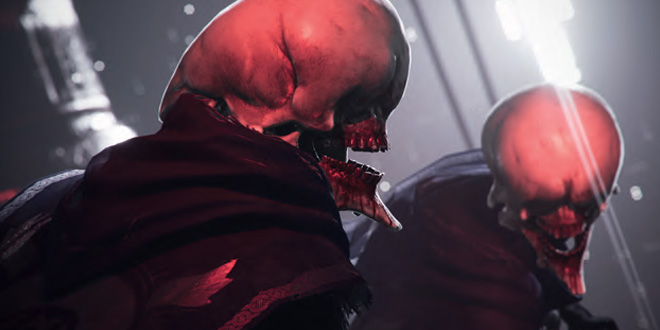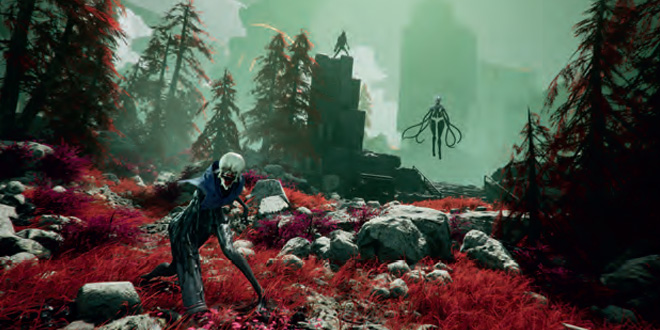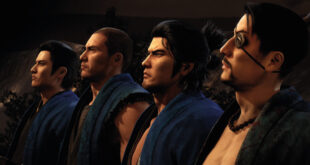
 Vince Pavey spoke with Hollie Emery and Benni Hill from Bonsai Collective, to find out how the studio behind Luna Abyss is encouraging not just its own growth, but is carefully cultivating change in the wider industry as well.
Vince Pavey spoke with Hollie Emery and Benni Hill from Bonsai Collective, to find out how the studio behind Luna Abyss is encouraging not just its own growth, but is carefully cultivating change in the wider industry as well.
If you’re a follower of video games, then Luna Abyss should be on your radar. It’s a gnarly first-person action-adventure game with a focus on an atmospheric narrative, interesting world building and pulse-pounding bullet hell action. It comes to the world from Bonsai Collective, an up-and-coming UK remote studio with its leadership in and around Manchester.
Bonsai Collective was imagined as a remote studio from the beginning, even before there were several pandemic related lockdowns around the world. That was always the plan – because they had desired to do things differently. “We always intended to be a remote-first studio, explains Bonsai’s production director and co-founder Hollie Emery. “We wanted to work with talented folks, without the limitations that an onsite studio has.”
“Our intention was to do things differently. We wanted our studio to cater to different lifestyles, backgrounds, disabilities, including immunocompromised persons, and underrepresented voices. Being a flexible remote studio was a starting point to achieve this. “We founded the studio in Summer 2019, began our concept development in Autumn 2019 and started seeking investment in February 2020. Covid-19 kicked in just before we went to GDC to pitch the game. Our goals were well aligned, considering the pandemic.”

The individuals that ultimately founded the Bonsai Collective had been working together for a while on some interesting games, and it was the existing relationships that had formed between them that made them decide to work together on a more permanent basis.
“The journey started when Harry [Corr] and Benni began working together on the puzzle game Q.U.B.E. 2 back in 2016 whilst I was still at Team17,” says Emery. “Benni and Harry discovered they really enjoyed working together on that project, and they then had an opportunity to work on another contract with a large UK development group.”
“We needed an experienced producer, and that’s how we came to work with Hollie, who was looking for new challenges.” adds Bonsai’s creative director Benni Hill. “On that contract we realised all three of us had similar aspirations and goals. Taking our experiences of working in the industry and setting up something that in our eyes, would improve on some of the challenges we had faced, with inclusion and diversity being a core value.” It also turns out the name ‘Bonsai’ came before ‘Bonsai Collective’, and that while it doesn’t have that much to do with the studio’s debut title Luna Abyss, it does have a lot to do with the studio’s guiding ideals.
“The name Bonsai originally came about when we were doing contract work,” says Emery. “Benni used it as the term for the work he was doing in storytelling. It represented the idea of ‘Carefully Cultivated Stories for Videogames’.” “By extension,” continues Hill, “when all three of us decided to set-up our studio, that idea of careful cultivation carried across to all aspects of our work; from our team members to our wellbeing, our identities, the games we develop, and the relationships that we build. The collective aspect just referred to the three of us coming together collectively with our past experiences to drive our studio forward.”

Inclusivity and well-being are high on Bonsai Collective’s list of priorities, and that’s by design. Everyone at the company discusses identity before they even sign on, to prevent potential clashes and pick out the right people. “The first thing we ask any person we speak to; whether it is a job interview or business relationship is what their pronouns are,” says Emery. “Identity and acceptance are incredibly important to us, so having that as our first questions in an interview, for example, sets the tone for our beliefs and goals.
“I’m a strong advocate for trans-rights and LGBTQ+ representation and our team are staunch supporters of this advocacy. We ensure that if any of our team members wants to do advocacy-based work that we give them the time and space to do that. For example, taking part in initiatives with Limit Break or Safe In Our World during working hours.” The studio’s heads are also firm believers that any company should look after its employees, and Bonsai Collective puts that viewpoint into practice in as many ways as it feasibly can.
“We ensure the studio offers a number of benefits to our employees that support their wellbeing,” says Emery, “such as private healthcare with 24/7 mental health support, flexible working hours, time out for therapy and other important appointments, as well as a chair and desk package to ensure our staff’s physical wellbeing is looked after whilst building our awesome games.
“Prioritising mental health is incredibly important and this has been key from day one. We’ve done this by leading from example. I let the team know when I have therapy appointments, if it’s during working hours and I need to use flexitime.
“Growing a young studio has had its challenges, especially as the team-size has grown, and as development has progressed. One of the main challenges is how our roles as directors have changed. The communication changes that come with that and being able to delegate responsibilities to team members. Shifting your role from being very hands-on to more managerial to achieve your studio’s goals is a learning process for sure!”

The team has of course seen several big challenges during the development of Luna Abyss and establishing a new studio, perhaps the biggest of which was just making sure that people that are working remotely are talking to each other and actually feel like part of a larger team.
“One the larger challenges that we faced as a remote studio, as I think most remote-studios face, is keeping communication between different disciplines in the team open and clear,” said Hill. “We noticed that somewhere in the middle of production that our comms were becoming a little siloed for different departments like art, design or tech, and that although communication was strong in any given department, communication across departments needed improvement.”
Thankfully, once the issue had been brought to the attention of the co-founders it was swiftly addressed with some smart organizational changes to the way discussions were set up online.
“This was a great growth point for us,” says Hill, “because as an independent developer, we had the flexibility to rethink how we were approaching features and levels in the game. We reorganised our comms with a strike system to better reflect the multidisciplinary nature of what we are building. Now we have people discussing features together, which is 100% something we are going to carry over into our next projects.”
It hasn’t been all challenges though, and Emery is keen to share some of the things they have most enjoyed about growing their Bonsai Collective so far: “Building our team is the absolute highlight for sure, and being on this journey with so many talented developers who share our vision; whilst bringing new perspectives to help us grow. “Announcing the game was also a real highlight! Hitting nearly a million views of that trailer and seeing the gaming community get excited about what we are building was such a special moment.”

While Luna Abyss has been described as a bullet-hell shooter, it also shares several things in common with the classic shooters from the heyday of the genre, such as those from id Software and Valve, in what is a case of looking back to move forward. Hill explains: “One of our initial thoughts when founding Bonsai was that we wanted to create contemporary games with that classic feeling, so looking back to move forward is an apt expression for what we set out to achieve.
“I think we have stayed largely true to that vision throughout the development of Luna Abyss – we knew that we wanted the gameplay to be pick up and play, drawing upon some of our favourite classic shooters. That got us really thinking about how an FPS adventure game with bullet hell elements would feel and how something like that could work.”
Of course, we wouldn’t quite describe Luna Abyss as a “Boomer Shooter” (though some might) and the team at Bonsai Collective have also been sure to take influences from all sorts of places, as good game developers do. That can be things as simple as innovating and addressing problems they’ve had with other titles, or taking inspiration from the coolest of sci-fi anime and manga, as Benni Hill explains: “We have several inspirations from many different areas. Tonally and environmentally, we have been inspired by manga such as Tsutomu Nihei’s BLAME! and anime like Hideaki Anno’s Neon Genesis Evangelion. In terms of gameplay we were inspired by the classic shooters we played growing up like Half-Life and Metroid Prime. The bullet element came from the visceral action of the Nier franchise and seeing how they utilised bullets to create really exciting combat spaces and patterns.
“One of the main problems with FPS games with bullet spread” he continues, “is the peripheral vision you inherently lose compared to a third-person or top-down shooter – and we knew from the start we wanted this to be primarily a story shooter experience and not overtly difficult and punishing.”
“There has been a trend for the difficulty of these visceral experiences to be a barrier to entry in some franchises. Although some of those games are our favourite experiences, we knew we wanted Luna Abyss to be an experience that was accessible to players who want to play those type of games, but maybe struggle with the intense dexterity required.
“To solve both the bullet-hell-in-FPS issue and accessibility we developed a z-targeting style lock on mechanic that allowed players to orient themselves around bullet emitting enemies, but also create focus attack points that didn’t require precise aiming. This worked well and became a core component of the game. Of course for players that really want a challenge, not using the lock-on is also an option worth a try if you really want to challenge yourself!”
As for what’s next for Bonsai Collective after Luna Abyss? That’ll probably depend on what the gaming audience’s reaction to their debut title is like.
“We are thinking about what is next, and where we want to go beyond Luna Abyss, but right now it’s too early to say much on the matter,” explains Hill. “We’re keen to see how gamers feel and listen to their perspectives and suggestions to help us drive where we go next. Whether that’s with Luna Abyss or another IP, our hearts are firmly committed to telling great stories with great action.”

 MCV/DEVELOP News, events, research and jobs from the games industry
MCV/DEVELOP News, events, research and jobs from the games industry




